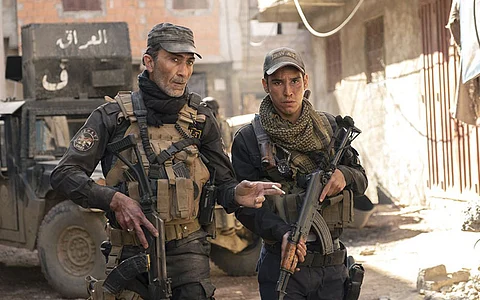
- In-Depth Stories
- Web Stories
- Reviews
- News
- FC Lists
- Interviews
- Features
- FC SpecialsFC Specials

Director: Michael Carnahan
Cast: Bilal Adam Bessa, Suhail Dabbach, Is'haq Elias
Streaming on: Netflix
War is the physical manifestation of ideological constructs like patriotism, loyalty, duty and pride. Young men and women kill one another to preserve social constructs such as country and culture. But the real enemy is intangible, because the purpose of battle has little to do with its participants and pawns. War is not conceived to be a personal essay: it has no place for the intimate humanity of pain, grief, empathy and compassion. The system demands clinical robots, before spitting them back out as wounded humans.
So when the irritated protagonist of Mosul, a 21-year-old Kurdish police officer recruited into an elite Iraqi SWAT team, keeps asking his veteran colleagues what exactly their mission is ("we keep going, but where?"), he is in fact emblematic of every young recruit in every army waging every war that isn't explicitly theirs. His frustration mirrors the political pointlessness of war: of sacrificing private lives for public causes. Throughout the film, Kawa (Bilal Adam Bessa) wants someone to explain to him their endgame: Destroying the last few ISIS strongholds in this broken city, sure, but why go rogue? Why not fight as part of the Armed Forces? Why adopt this Inglorious-Basterds reputation to defeat a common villain? Why is ISIS wary of this particular SWAT team? Why become the enemy you set out to defeat?
At first, Kawa suspects it's pure, primal revenge. The film opens with the SWAT team gunning down a bunch of ISIS terrorists attacking a police convoy. Kawa is part of the hapless convoy, and the fabled squad – led by Major Jaseem (an excellent Suhail Dabbach) – recruits him immediately, but only because his uncle died in the gunfight. Major Jaseem insists that only those who've lost family and loved ones to ISIS would make for useful additions to their hit-squad. Kawa is taken under their wing, and the team moves through the wartorn town in rusted humvees, staking out terraces and basements, hunting for the monsters that burnt their homes and raped their women. A single-minded madness drives them, but none are willing to tell Kawa about the anatomy of this madness. They need him, but he wants a good reason to be needed. It has to be vengeance, what else is left to fight for? They were once noble men with futures and families. They now behead terrorists and trade cigarettes for weapons, cold-blooded and remorseless. They are their own nation.
Mosul, like most great war (and by extension, anti-war) movies of our times, uses the vérité style of filming to great effect. Based on an acclaimed New Yorker article by Luke Mogelsen, Mosul has the coherent heart of a fictional film and the brutal body of a documentary. The camera shadows the group, becoming both hero and victim during intense combat scenes. It uses the gaze of the newcomer Kawa, replicating his jittery role in a faceless conflict. But in between all the violent action and sweaty strategizing, the writing remains thoughtful. For instance, Major Jaseem has a habit of clearing the trash from each of their temporary (and wrecked) hideouts – as if he were a guest lending these "places" the dignity of being the homes they once were. At one point, he sheds his hard exterior to shelter two orphaned children on the street: they are pressed for time, but the older man can't help but fleetingly fan the final flames of fatherhood. Moreover, his first impulse when his team members perish in battle is that of utter agony: he wails and weeps, the aura of leadership momentarily abandoning him. Kawa watches, suspecting that perhaps there's a different sort of depth to his bloodlust.
The film also almost unfurls in real time, over a couple of hours on a hot day – in a way evoking the narrative density of the single shot of Sam Mendes' 1917. What this does is reveal war's compression of time: with bonds forming and breaking, boys turning into men, minds expanding and the entire cycle of life being accelerated by the unforgiving pace of warfare. The rakish Kawa at the beginning is very different from the steely-eyed Kawa at the end: his journey charts barely half a rotation of the planet, but it does the work of half a revolution.
Only in the final minutes do we learn of the SWAT team's true intent. It's a powerful, profound scene – a revelation that opens Kawa's eyes to the subtext of their nowhereness. He gets the answer he didn't know he needed. For a viewer, the entire film acquires a retrospective coat of spiritual paint. Suddenly, the vocabulary of war becomes redundant: terms like "Iraq" and "ISIS" and "America" seem futile. They fade into the distance. It's the people of war who reclaim the implications and consequences of suffering. It's the hearts that wear the ruse of bodies. The climax reframes war as a personal essay rather than a statistical report. Language does matter: Most soldiers are trained to kill for a living, but the men of Mosul kill for the living. After all, not every land can afford the privilege of the right quote. In the ghost-town of Mosul, living – just living – is the best revenge.